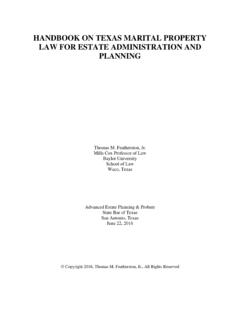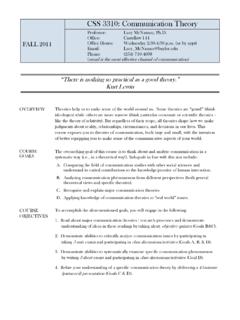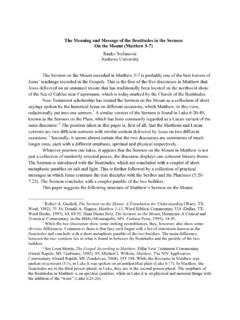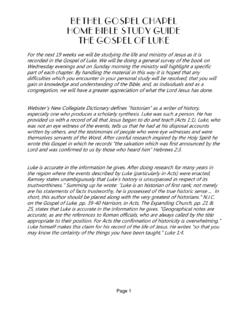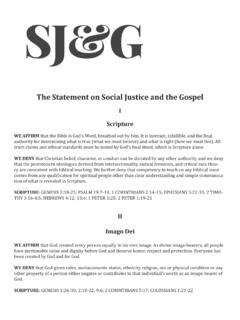Transcription of Divine Justice as Restorative Justice
1 Divine Justice as Restorative Justice 11D i v i n e J u s t i c e a s Restorative JusticeBy Chris MarshallWhile it contains retributive components, God s Justice is fundamentally a restoring and renewing Justice . Knowing this, the Church is obliged to practice Restorative Justice in its own ranks and to summon society to move in the same consider the Bible to be a uniquely important source of guidance for matters of theological belief and moral practice. The Bible serves as the normative, though not exclusive, reference point for discerning the will and ways of God.
2 What the Bible says about Justice , therefore, ought to be of great significance for shaping Christian thought and action on Justice issues coming to grips with biblical teaching on Justice is by no means easy. The sheer volume of data to be considered is daunting. There are hundreds of texts in the Old and New Testaments that speak explicitly about Justice and righteousness (terms that coincide and overlap in meaning), and hundreds more that refer to Justice implicitly. The biblical data is also very diverse.
3 Different biblical writers sometimes take different positions on what Justice requires in differing circumstances. It is also important to recognize that biblical reflection on Justice takes place within a larger cultural and religious worldview that is quite unlike that of modern secular society. To understand the Justice theme in the Bible requires us to cross over into a very different social and political world than our own. Then, having crossed over, we need to decide what to bring back that is pertinent to our world.
4 This is a task requiring considerable herme-neutical to these complications is the complexity that surrounds the con-Copyright 2012 Center for Christian Ethics 12 Prisoncept of Justice itself. What actually is Justice ? How should we define it? Where does it come from? Does Justice have an objective existence or is it simply the product of social agreement? Is there some stable essence to Justice such as fairness or equality or just deserts or does Justice mean different things in different contexts?These are very difficult theoretical questions to resolve.
5 They cannot detain us here, though some points are worth making. Certainly, as far as the bibli-cal writers are concerned, Justice does have an objective existence, because Justice derives from God (Deuter- onomy 32:3-4; Psalm 89:14; 145:17), and God exists apart from human specu-lation. Justice is objectively real because God is real. Justice is not simply a prod-uct of social consensus. It is a Divine attribute. There is no trace in the Bible of the moral and epistemological skepticism that plagues contemporary philosophical discussion about Justice .
6 Neither is there any simple-minded objectivism at work. Just as our human capacity to know God and the truth about God is limited by sin (cf. Romans 1:18-23), so too is our capacity to know fully the nature of God s universal Justice . Our ability to grasp the meaning of Justice is constrained by our creaturely finitude. It is also constrained by historical circumstance. Our experience of Justice and of reality in general is always mediated through particular cultural and historical traditions. It is therefore unavoidably con-textual.
7 It can only be partial, fallible, and provisional. This is an important warning against seizing on selected biblical texts or practices to do with jus-tice (such as those mandating capital punishment or chattel slavery), isolating them from their historical context and canonical setting, and absolutizing them as an unchangeable expression of God s eternal Complex VirtueSince ancient times it has been recognized that Justice is a complex or multi-dimensional value that applies to a broad range of human endeavors in varying ways.
8 At the most basic level, a distinction exists between distrib-utive or social Justice , which deals with how goods and resources are justly distributed between parties, and corrective or criminal Justice , which deals with how wrongdoing is identified and penalized. Biblical teaching has much to say about both spheres, though here our focus is only on corrective Justice . retributive Justice is dogged with impreci-sion. When retribution is used alone, it evokes the idea of vengeance or retaliation. Paired with Justice however, it implies a measured delivery of punishment as due recompense for wrongdoing.
9 Divine Justice as Restorative Justice 13 But it is vitally important the two domains are not viewed in splendid isolation, especially when seeking to apply biblical insights and priorities to our context. Much of what the Bible says about social Justice has direct rele-vance to the criminal Justice domain. If we took more seriously the biblical imperative to care for the poor and dispossessed, to avoid the unjust accu-mulation of wealth and power in the hands of the few, and to set at liberty those who are oppressed by debt or exploitation.
10 We would have less cause to employ criminal sanctions against those on the margins of the community who feel they have no stake in Justice As retriButiVe JustiCeIt has often been asserted that the Bible articulates and endorses an essen-tially retributive conception of corrective Justice . But is this so? The answer is not as simple as some assume. Discussion is complicated by the fact that the phrase retributive Justice is dogged with ambiguity and imprecision. It is one of the most confusing and misunderstood concepts in criminal jurispru-dence, and this confusion spills over into biblical studies as word retribution (from the Latin retribuere) simply means repay-ment the giving back to someone of what they deserve, whether in terms of reimbursement, reward, or reproof.





